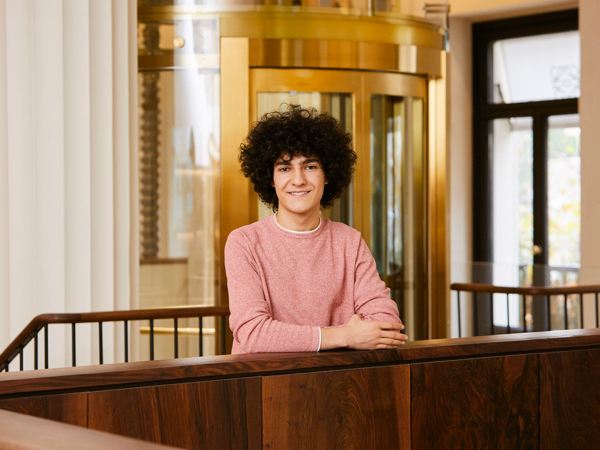Mario Obrero (Madrid, 2003) believes poetry “doesn’t exist by chance. It is the result of very specific reasons or circumstances based on the mandates of beauty and the possible existence of a different horizon”. The poet’s youth has been no impediment for his admirable career: he began writing poems at the age of seven. Obrero explains that “Machado’s ‘today is ever always’ is a reality, and in today’s poetic universe, Lesbo’s Sappho is just as relevant as the young poets I admire and with whom I spend time with at conferences”.

Obrero, who has published and received prizes for several books of poetry, won the 23rd LOEWE FOUNDATION Young Poet’s Award while finishing his baccalaureate at the La Senda de Getafe Public High School and taking guitar lessons at the local Professional Conservatory of Music. “It was Monday and I was at home, cooped up in the attic, that quasi aerial space I inhabit”, he recalls. “I had just come out of the first session of an online poetry reading club that I was lucky enough to be enrolled in, led by Jordi Doce from the Fundación Centro de Poesía José Hierro. That first day we had been reading Seven Modern American Poets (Pamiela, 1991). I like to think that Pastan, Rich, and Forché were somehow responsible for that unexpected call, which I received while playing Moreno Torroba’s Torija on the guitar”, he adds.
Thanks to the lockdown “I did something that I’d never had a chance to do: I corrected my poems in an environment where poetry was the driver of hope and was also responsible for giving meaning to such an abnormal situation. It was the final push Peachtree City needed”, he recalls. “Having had the time to construct the book, to focus on its cycles as it came to life, and to calmly develop its contents through hard work encouraged me to submit the final result to the Loewe Prize”, he adds. It’s a book in which “the vocabulary of the experience itself and of the poetic voice used was new: words such as dollar, peanut, celery or gallon appear often as a result of new discoveries”. On the other hand, he adds, “I try to develop something that was already palpable in my previous book, Ese ruido ya pájaro (Ediciones Entricíclopes): the resonance and diverse plurality of language. I continue to reconcile -or at least I try to reconcile- the complex and multiple nature of poetic expressions. That is, to show the ‘marvelous disorder of things’ that Hierro talked about or the multitude of Bosch’s Garden of Earthly Delights“.

When asked about his role models, he replies: “My great-grandfather Dionisio, my grandparents, and that family buried in the humblest of graves, whose name has almost faded away. Poets Whitman, Ginsberg and Lorca for their rebellious voices, their energy, and their accurate description of all that is crude and dirty in the United States”. Juan Ramón Jiménez and José Hierro, both of whom make an appearance in his poem ‘New York’. And “two magnificent fellow writers who, in a certain way, are the book’s backbone”: Ramón Piñeiro, whose book A filosofía da saudade spoke to him “about what is close but unmentionable” while living in Peachtree City, and Virginia Woolf, whose work he read in English, the language it was written in, while editing his own work. Her Orlando became his pen name when he sent his submission in.

Mario Obrero’s academic circle has been incredibly supportive. “The vast majority of my classmates and professors show fellowship and enormous affection. I think many of them understand the public nature of the joy that accompanies a prize such as this one and the role one’s community plays in poetry. Without my Latin teacher, the texts we read in philosophy class, or the historical analyses we worked on, my writing would not be what it is today. Therefore, the general view at my school is that the prize is a reward for a way of existing in the world and for a teaching approach based on the belief in others and on the ability to achieve difficult goals”, he explains. His immediate plans are to be like “one of those people in Lorca’s Canciones who went in search of all that is green with guitars and roosters. Be that as it may, working hard and putting one’s best efforts forward is of utmost importance in any human endeavor. The edifice of language cannot be built with one’s will or with natural talent alone. Therefore, I continue to work on looking at the world through the eyes of a poet, to appreciate that which may appear insignificant and to give value to what others deem to be trivial”.
Photo captions: Mario Obrero, photographed by Álvaro Tomé for LOEWE FOUNDATION, 2021.
